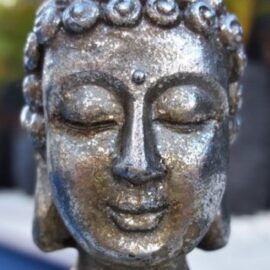

This article is an excerpt from the Shortform book guide to "The Book" by Alan Watts. Shortform has the world's best summaries and analyses of books you should be reading.
Like this article? Sign up for a free trial here.
What’s the Western concept of self? Was Plato right about the soul? Are some of us just fooling ourselves about our true nature as humans?
Many people in the West internalize the idea that each of us is an individual—an entity separate from others and our surroundings. This basic understanding of identity is so foundational to Western society that most people never question it. But, British philosopher Alan Watts questions it in The Book.
Keep reading to learn why Watts thinks the idea is misguided and what he believes our true nature is instead.
The Ego Illusion and Our True Nature
In our discussion of the Western concept of self, we’ll start by describing the ego, the ego illusion (Watts calls it the “ego trick”), and how Watts defines our true identity as being one with the universe—which we’ll call the Cosmic Being.
The ego is essentially feeling like an “I”—an individual consciousness contained in a body. Watts defines the ego illusion as the false sense of being an individual who exists as an entity separate from other people and the environment. Watts argues that this is the fundamental assumption that guides Westerners’ relationship with the rest of the world, causing them to feel isolated and at odds with nature.
(Shortform note: This idea of the ego illusion comes from religions such as Hinduism and Buddhism, which both deny the existence of a “self” and identify the ego as the source of human suffering. By contrast, Western philosophy and religions generally believe in an analogous concept of individual egos, although the terminology varies. For example, the French philosopher René Descartes believed that the mind is the essence of a person, while Christians generally refer to the soul.)
Another aspect of the ego illusion is the Western idea that we enter the material world when we are born and then later depart it when we die. Although people have different beliefs about an afterlife, there’s still an underlying assumption among Westerners that humans are individual entities who cease to exist on the earthly plane after death. For atheists, humans physically decompose, and that’s the end of their existence. For most Christians, people’s individual souls move on to the spiritual realms of heaven or hell.
(Shortform note: Although Watts generalizes about the temporary nature of the Western ego, the ancient Greek philosopher Plato (considered a founder of Western philosophy) believed that the soul was both uncreated and eternal. He wrote that individual souls are reincarnated into different physical bodies forever. The main difference between Plato’s eternal soul and the Cosmic Being is that there are multiple, individual souls in Plato’s philosophy.)
Our True Nature
Despite this Western concept of individual identities, Watts argues that we’re not really isolated beings, and we don’t enter or leave the world because we’re all part of the Cosmic Being that has always existed. In fact, more than being part of the Cosmic Being, each of us is the Cosmic Being, taking different forms and playing pretend in different roles (different humans, animals, plants, and minerals). What we think of as “I” is just one expression of the Cosmic Being in a particular time and place, but our real identity is the entire collection of beings and their environments and their relationships to one another. (Shortform note: This concept that there are no separate entities—only one Cosmic Being—is called non-duality.)
| Comparing Watts to Another Non-Dual Western Philosophy In Conversations With God, Neale Donald Walsch makes a similar argument for non-duality—the idea that we are all one—but with slight differences in his representation of the Cosmic Being. For example, he claims that God split itself into infinite forms and created the world so that sentience could exist. Walsch argues that God couldn’t know itself unless there was something besides God. Therefore, God created other beings that could experience God from a different perspective. As a result, life is essentially a game of remembering our true nature as God and enjoying existence. This is similar to Watts’s playing-pretend model except that Watts never provides a motivation or justification for why the Cosmic Being manifests in so many different forms in the universe. In addition, the two authors differ in their terms for the Cosmic Being. When using the word “God” for a Western audience, people tend to conceptualize it like the God of Christianity, Judaism, and Islam—a paternal, king-like figure who is envisioned as a person. Watts emphasizes that his Cosmic Being concept is much grander than a person or any particular physical form. |
The Limitations of Language
Watts writes that the Cosmic Being transcends language, which is inherently limiting, so it’s impossible to adequately explain the concept with words. “Knowing” ourselves as the Cosmic Being is more of an experience than an intellectual understanding. He notes that because of the inadequacy of human languages, the Cosmic Being has many names, including “God,” “Ultimate Ground of Being,” and “Existence.” The Cosmic Being isn’t a supernatural, all-powerful being who controls everything, but rather is everything.
| Translation of Eastern Philosophical Terms One of the challenges of interpreting Eastern spiritual philosophy in English is the fact that the ideas were originally written in Sanskrit in the Vedas—ancient religious scriptures. The oldest of the Vedas was written around 1500 BC and defines the Cosmic Being using the Sanskrit word “Brahman.” Scholars translate it as the unchanging and infinite ultimate reality. Although Watts uses the word “self” and “ego” interchangeably, the Sanskrit word “atman” refers to the self that is distinct from the mind, body, and ego. The term anātman refers to the belief that there’s no fundamental “self.” The non-dualist schools of Hinduism believe (like Watts) that Brahman and atman are the same, while the dualist school of Hinduism claims that Brahman, atman, and matter are all separate entities. |

———End of Preview———
Like what you just read? Read the rest of the world's best book summary and analysis of Alan Watts's "The Book" at Shortform.
Here's what you'll find in our full The Book summary:
- Why the concept of humans as separate beings is an illusion
- Why Westerners must release their egos to end some of society's biggest problems
- How people can escape from the ego illusion






